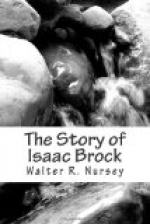The Indian, though of middle height, was of most perfect proportions, an athlete in bronze, lithe and supple as a panther. His oval face, set in a frame of glistening black hair, shone like a half-polished copper relief. Overlooking the nose, straight as one of his own arrows, and from which some tinkling silver coins were suspended, a pair of hawk-like eyes, hazel-black and unflinching—in which the secrets of the world seemed slumbering—gleamed upon Brock. His dress, a hunting jacket of tanned deer-skin and close-fitting leggings. Fringed mocassins of the same material, richly embroidered in silk and porcupine quills dyed in divers colours, encased his feet. The light from the open log fire flickered fitfully, half revealing the antlered heads of moose and caribou and other trophies of the chase that, hanging from the rafters, looked down upon the group, adding weirdness to the picture.
Brock briefly explained that he had come to fight the King’s enemies, enemies who so far had never seen his back, and who were Tecumseh’s enemies also. “Would Tecumseh maintain an honourable warfare?”
Perhaps no eulogy of Brock was ever penned that so well summed up his qualities as did the terse, four-worded certificate of character uttered by the Indian before replying to the British general’s appeal. Tecumseh looked “Master Isaac’s” commanding physique up and over, over and down—Brock’s caution as to waste of powder doubtless weighing with him—until eye met eye, and then, impulsively extending his thin brown hand, turned to his followers, exclaiming in tones of highest admiration:
“This is a man!”
Assenting “Ughs” and “Ho-hos” followed in rapid succession, and in response to Brock’s invitation the headmen, painted and plumed and in striped blankets, squatted on their stained reed mats and wild-beast skins on the basswood log floor. Questioned as to the nature of the country westward, Tecumseh took a roll of elm-bark and with the point of his scalping-knife traced on its white inner surface the features of the region—hills, forests, trails, rivers, muskegs and clearings. Rough, perhaps, but as accurate, he said, as if drawn by a pale-face teebahkee-wayninni (surveyor).
That night, after Tecumseh’s return, Brock again held council with his staff, proposing an attack on Detroit. Only one of his chief officers, the staunch colonial quartermaster, Lieutenant-Colonel Nichol, agreed with him. Colonel Henry Procter, from whom he had expected whole-hearted support, strongly objected. History teaches us that the conception of a daring plan is the offspring of great minds only. Procter was not of this class, as his subsequent record shows. Some of our hero’s critics have described his resolve to attack Detroit as “audacious and desperate.” Isaac Brock was, of course, nothing if not contemptuously daring. The greater the difficulty that faced him the more was he determined to challenge the obstacle, that to a less confident




